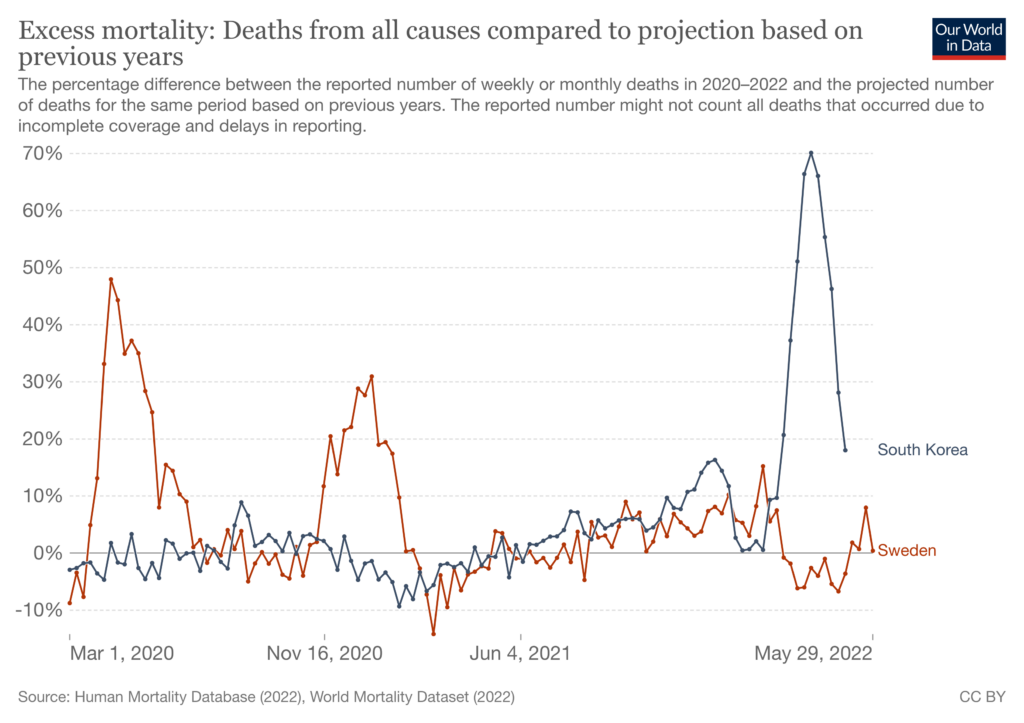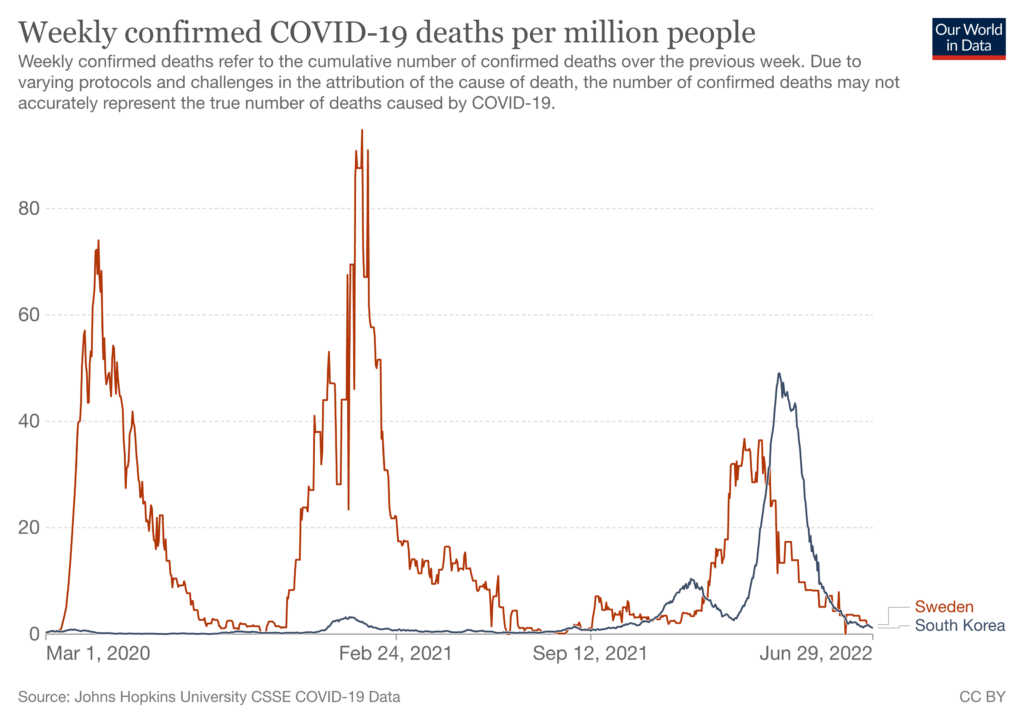Until recently, South Korea was the poster child for the ‘contain and vaccinate’ strategy, having kept infections to a minimum until completing its vaccine rollout.
In November of last year, former ‘Zero Covid’ proponent Devi Sridhar argued, “It is never too late to learn lessons from countries such as South Korea, which pursued maximum suppression, and succeeded.” And in a super-viral tweet, Vincent Rajkumar (a professor at the Mayo Clinic) proclaimed, “South Korea followed the textbook principles of epidemiology. Kept deaths 40 times lower all the way till 75% of population fully vaccinated. This is success.”
All that was true until February of this year, when the country saw its first major outbreak. This outbreak, as I noted previously, led to a large spike in excess mortality; by March’s end, the number of weekly deaths was almost 70% higher than normal.
Owing to this spike, South Korea now has the same excess mortality as Sweden – which took a famously relaxed approach to dealing with Covid. Note: the chart below is based on weekly deaths, rather than age-standardised mortality rates, so it overstates excess mortality in both countries.

Incidentally, you wouldn’t know this from looking at the official Covid death rates. As the chart below indicates, the number of ‘confirmed’ Covid deaths per million people is much higher in Sweden, presumably due to differences in testing or diagnosis. Which illustrates the importance of tracking excess mortality.

So, the country that did least to contain Covid has ended up with the same death toll as one of the countries that did most. What’s more, the majority of Sweden’s infections occurred before the vaccine rollout, whereas the vast majority of South Korea’s occurred after. Which suggests the benefits of containing the virus until after the vaccine rollout have been overstated.
Of course, South Korea didn’t do terribly. By containing the virus using border controls and contact tracing, they avoided really draconian lockdowns, and saw a comparatively mild downturn. Yet the measures they took still constitute a major infringement on civil liberties. As the Guardian notes, “Koreans’ movements were so finely and publicly tracked that secret love affairs and even hidden sexualities were brought to light.”
Anyone who cares about civil liberties will now have to ask whether South Korea’s strategy was worth it, given that Sweden ended up with the same death toll.














To join in with the discussion please make a donation to The Daily Sceptic.
Profanity and abuse will be removed and may lead to a permanent ban.
Whenever the NHS is mentioned on here, or outlets such as the Telegraph and Spectator, people pile in about the wasteful bureaucracy, useless managers, pen-pushers, etc.
But almost no one says anything about doctors.
This article: doctors, of all types, must have known that the withdrawal of non-covid health treatment would be an absolute disaster. Anyone with a functioning brain knew it.
And yet, with a very few exceptions, doctors said and did nothing. Ditto the stabbings.
There is something very, very wrong with the medical profession. I don’t know exactly what, but I do know something is very wrong.
Karol Sikora was one of the exceptions.
https://www.telegraph.co.uk/news/2022/08/12/called-killer-warning-lockdown-harms/
Yes, but even he was content to go along with lockdowns in the early days, although eager to get out of them in ‘small steps’, while accepting the necessity to ‘carefully monitor for any second wave’. See from 8 April 2020:
https://www.spectator.co.uk/article/how-to-find-a-safe-way-out-of-the-coronavirus-lockdown/#comments-container
As I recall, I made a couple of comments btl, as well as our very own Will Jones. Interesting to see now, nearly three years later, how such posts have stood the test of time.
A lot of people now posing as radically anti-lockdown were a lot more equivocal back in those early days.
Well, to be fair, in April 20 I was content to go along with lockdowns. I had bought the three weeks to flatten the curve lie. I didn’t wake up until July 20 after tracking the numbers over the summer using Worldometer and the re-imposition of restrictions on the people of Leicester. I did some research and realised from NHS 111 triage data the first wave had peaked before the lockdown could have had any affect. At the same time I found this site. I have maximum respect for you and others who were opposed to lockdowns from the start.
Many thanks. March/April 2020 were heady days, and to criticise lockdowns was to go right out on a limb, on your own. This site didn’t exist, and there was no focal point of resistance. Peter Hitchens perhaps, and perhaps the Spectator, Spiked, Lord Sumption (a pivotal intervention, right at the start; shame he blemished himself over the stabs, likewise Spiked, and even Mr Hitchens) but right now I can’t think of much else. To question lockdown was to be dubbed a cynically selfish murderer.
As I re-read that Spectator threat, from early April 2020, I see I wrote:
We can’t stay in lockdown for months or years until a vaccine is found (AND implemented). It seems that the only other way the spread can be contained is through herd immunity. But that means a great many people must be exposed to the virus. Implicit in this argument is that there needs to be a (possibly quite large) background level of transmission.
So WHY ON EARTH are low-risk people being instructed not to go outside??
I can understand why the number of cases needs to be kept at a level at which the NHS can cope. Hence I can understand the need for some level of social distancing, and especially the need for vulnerable people to isolate. But lockdown??
Lockdown means destroying the economy (with all the concomitant health damage) and the destruction of our civil liberties. …
Not a lot I’d change 3 years later, except that I probably over-estimated the degree to which ‘social distancing’ would slow infection rates, and I was naive about how corrupt and evil the vaccine developers actually are. It’s worth pointing out that even now, nearly three years later, there is no effective vaccine (quite apart from a safe one).
They are highly educated, over-domesticated humans that have little capability or even desire to think for themselves.
In an interesting inteview, Eckhart Tolle explained quite well how it is that intelligent people very often do very stupid things. Not occasionally, but constantly and persistently.
He draws a distinction between intelligence, which is related to performing specific tasks with competence and wisdom, which is related with making good decisions, usually of a complex nature.
The key to wisdom is not intelligence but awareness. You can be very intelligent but lack awareness. In fact, the more absorbed you are into something, as intelligent people often are, the less aware you can become.
You can also lack awareness because you refuse to see things out of convenience or fear.
So, lack of awareness, lack of wisdom. And lack of wisdom makes you do stupid things.
I found that explanation very enlightening.
Brilliantly put. I’ve heard it out this way: there are stupid people who are clever and clever people who are stupid.
Indeed, I’ve thought about those explanations too. Also that it appears the medical profession is extremely hierarchical, with an ethos of almost blind deference to authority imbued at every level.
But even so, even after allowing or all this, how can doctors be so apparently stupid?
In my view they can’t be. But that points to a whole load of other very uncomfortable questions.
My guess is that one problem is, despite their arrogance, doctors are actually very reluctant to take responsibility – and thus hide in the group so as to avoid responsibility. A hypothesis that imv deserves investigation – I can’t do it, asI’m not in the profession.
Anyone else got any ideas?
As I say, there is something very, very wrong here, which if we want a decent society we need to understand and correct.
WTF is up with doctors?
The obvious explanation is two-fold. 1) being paid £15/shot creates a huge conflict of interest 2) they’re now in it so deep they can’t possibly do a reverse ferret – that would make them a target for all manner of law suits.
Other professional institutions are quite similar, that is to say, hierarchical. They don’t want to be on the wrong side of the fence – after all, their personal balance sheet could be under attack.
42 years in the profession has taught me that it is blind deference to authority that causes doctors to be so “stupid”.
From succeeding at school and university, which requires memorising huge quantities of information and regurgitating it without analysis, to being coerced into following edicts from the medical colleges, health departments, etc.
Medical practitioners are great at rote learning but lousy at engaging their right brain, meaning they are unable to see nuance or context in their algorithms.
Many thanks for this – as I suspected. Yet does it really fully explain their inability to recognise what is starring them in the face??
As I write, I suspect it may well be in part owing to a reluctance to take responsibility, to stand up and go against the grain. Those fearful of responsibility will always take refuge in the crowd, and move with the crowd where they feel safe.
These are topics I believe need to be explored more fully – nice if it could be done ATL here. But I can’t do it, as I have no medical background. All I can do is stand on the outside, look in, and make observations. Any proper discussion would have to come from someone within or close to the profession.
But it seems to me that this is a very important subject. As I say, something is very wrong with the medical profession, and like it or not that’s bad news or all of us.
When I get past the security to actually see my GP, I intend to ask these questions directly to his face.
Good one! Please let us know how you get on.
The medical profession has changed in the 35 years I’ve been working alongside it. Increasingly doctors are political actors and have become much more collectivist in their outlook.
A year ago I witnessed one brave doctor asking pertinent sceptical questions about the Covid jab about to become mandatory. She was monstered by her colleagues whose arguments amounted to little more than emotional spasms and appeals to authority.
I think a generation ago doctors were more individualist, more patient focused, and more prepared to challenge conventional wisdom.
Good to hear a view from near to the profession.
She was monstered by her colleagues whose arguments amounted to little more than emotional spasms and appeals to authority.
That’s a terrifying statement, but one which rings oh so true.
As I say, wtf is wrong with doctors?
Genuine question. Any views welcome.
Just to state the obvious but…it’s going to get a lot worse as T cell production in boosted populations result in increased cancer across the board.
Gotta address the obvious elephant here…Doctors and pathologists ( Ryan Cole, Dr Hoffe, Ute Kruger etc ) have been warning of this for a while now and Dr Hoffe has been struck by how he’s seeing many significantly accelerated cancers in his Canadian practice. He talks about seeing tumours grow several inches in so many months, which is unheard of, and the common denominator is these patients have all been jabbed. They’re presenting with stage 4 cancers too, which means the prognosis is bleak. There’s videos of him talking about this and showing case studies. Here’s a short article describing the mechanism of how the jabs can accelerate cancers, so-called ”turbo cancers”;
https://www.newstarget.com/2022-11-15-t-cell-lymphoma-progress-rapidly-mrna-booster-shot.html
I don’t think this paper has myself as a reader in mind, well except when they are painting me as a ‘literal Naz!’.
“From Italy to Sweden, Hungary to France, the far right is once again a force to be reckoned with. Its hostility towards immigrants encourages xenophobes everywhere, including in the UK. Its social conservatism threatens hard-won LGBTQ+ rights. Its euroscepticism has already upset the dynamics of the EU.
The normalisation of far right rhetoric has gone far enough. For decades, Guardian journalism has challenged populists like this, and the divisions that they sow.”
Indeed
Loving the downvotes!
Suppression of the cancer control gene P53. – and on the immune system generally
https://www.sciencedirect.com/science/article/pii/S027869152200206X
See Ss. 2 and 4
Sent this to the bloody Guardian.
And the BBC.
They’re sure to take notice.
Not the impact of Covid, just of the folly & evil perpetrated by the state etc.
Nobody could have predicted this….
Well almost no one in the highly rained medical community that is.
I know 4 people who have been “suddenly” diagnosed with terminal cancer in the past year. One has already died; two others have months to live. The fourth is in Stage 4 but they’re planning to operate in a week’s time although the prognosis is still very poor. She’s considering cancelling the op and just letting nature take it’s course.
To put this into context, a year ago I only knew one person who had received a (bowel) cancer diagnosis (10 years ago) and she was successfully treated.
Ah of course Guardian, it was ‘a virus’ that caused this.
Seeing the Gates and Globalist funded Guardian report on the catastrophic effects of crushing a society and its health service for two years is like reading a forensic fire investigation report from the arsonist.
In August 15 months ago I noticed a penny sized black patch of skin on my back. My GP, a locum with no facemask who I didn’t know advised me not to bother with the NHS and gave me a phone number for a private consultant, while referring me on to my local NHS hospital. I saw the private consultant 2 weeks later, and she rearranged her list on the spot and removed the lesion (she said it was ‘striking’) which was subsequently confirmed as a malignant melanoma at a very early stage. A further operation was required just to be sure. The NHS after acknowledging receipt of my referral eventually offered my an appointment dated 16 weeks after the initial referral, a lead time of which they were aware but hadn’t bothered to tell me.
I wrote to the UK prime minister with the receipts asking to be refunded, he referred me to my regional assembly.
I wrote to the First Minister of my regional assembly. I received a response from the head of the civil service cancer strategy unit, by email. The letter was unsigned, not cc’d to the original addressee and had the wrong street address, and a total of 27 errors of fact, spelling or convention. And the blame was placed firmly on Covid-19.
I wrote to the head of my regional NHS Trust. After a second letter threatening legal action and requesting a copy of the risk assessment leading to the shutting down of the hospital, she responded and blamed high patient volumes. She foolishly told me that they knew how long the 16 week wait would be, but declined to say why I wasn’t told. And an apology along with a several paragraphs of meaningless word salad was offered, and rejected by me in my unanswered response. The NHS, and our political system has failed us. I struggle to see how things will change without a violent confrontation with the subsequent winners and losers.
Is it just the missed appointments? The bodies immune system is key in suppressing cancer cells (which pop up all the time). A widespread reduction in the immune system’s effectiveness could cause a cancer epidemic.
There’s me thinking it woz the jabs wot dun it !!..
Doctors are also highly controlled by their professional bodies. Their license can easily and quickly be removed, as has been shown many times over the last 3 years. Without their license they cannot work or feed their family. They cannot easily travel between countries since they are required to get licensed in that country. This power also extends to big pharma who can easily restrict access to medicins required for the Doctor to function. And we cannot ignore the fact the whole world was going mad. There was a great wave of insanity sweeping the world. Nothing they could do as an individual could make any difference, as was shown by those imminent Doctors who did speak up.